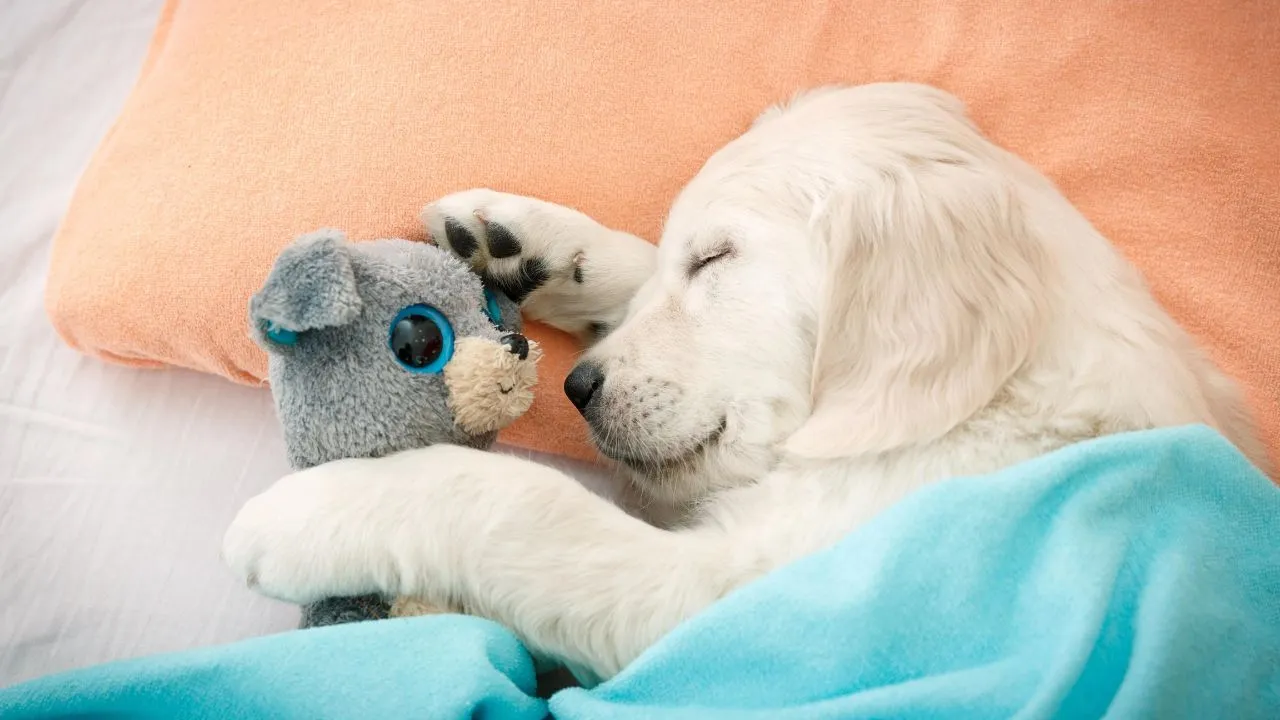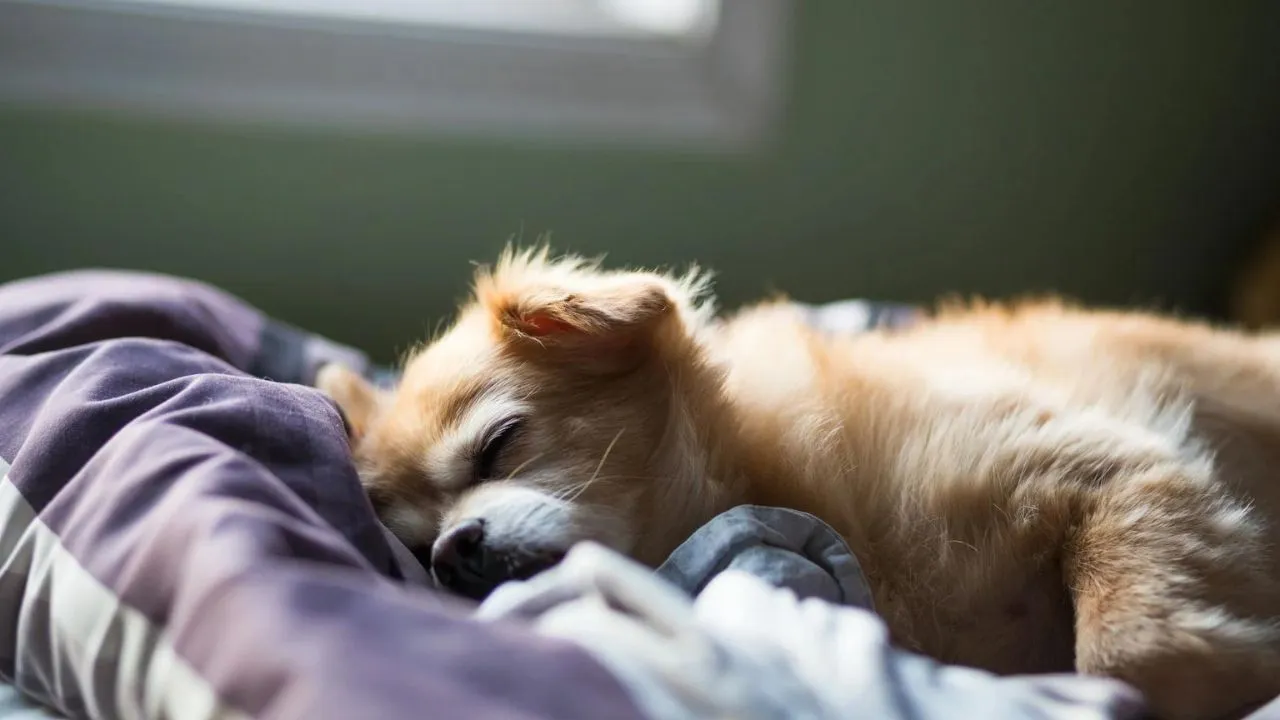Determining when a puppy can sleep with you at night depends on various factors such as age, Behavior, and training. Young puppies may not have the bladder control to last through the night, so it’s essential to gradually introduce them to sleeping alone. Consider crate training to provide a safe and comfortable sleeping environment. Once the puppy is older and has successfully learned to sleep through the night without accidents, it may be ready to sleep with you in your bed if desired.
When Is My Puppy Ready to Sleep with Me
Determining when your puppy is ready to sleep with you depends on age, Behavior, and training progress. Before owning your puppy to sleep in your bed, ensuring it is comfortable sleeping through the night without accidents is essential. Consider crate training as a stepping stone to help it develop good nighttime habits before transitioning to sleeping with you.
It’s Not Just about Age
The complexities beyond chronological age delve into factors like health, lifestyle, mindset, and experiences that shape a person’s well-being and outlook on life. This insightful perspective challenges the traditional notions of aging, emphasizing that vitality and fulfillment stem from a holistic approach. Discover how embracing a balanced lifestyle, positive attitude, and continuous learning can enhance your quality of life at any age.
Wait until Your Dog Is Potty Trained
Please wait until your dog is fully potty trained before giving it free rein in your home. Learn essential tips and strategies to effectively train your dog, ensuring fewer accidents and a cleaner living space. Patience and consistency are key in this crucial phase of your dog’s development. This guide provides step-by-step advice on recognizing signs, setting a routine, and rewarding good Behavior, helping you and your dog achieve potty training success.
Consider the Size of the Puppy
The puppy emphasizes the importance of considering a puppy’s size when deciding about their care, training, and environment. Smaller puppies may have different needs than larger breeds, including dietary requirements, exercise routines, and safety precautions. Understanding these differences ensures you provide the best possible care, creating a safe and nurturing environment tailored to your puppy’s needs.
Think about Your Sleeping Habits
“Think about Your Sleeping Habits” highlights the significance of examining and adjusting your sleep patterns for overall well-being. Quality sleep impacts physical health, mental clarity, and emotional balance. Reflecting on your bedtime routines, sleep environment, and daily habits can reveal areas for improvement. Implementing changes such as maintaining a consistent sleep schedule, lessening screen time before bed, and creating a restful environment can lead to better sleep quality and enhanced daily functioning.
Sleeping With Your New Puppy

Sleeping With Your New Puppy offers guidance on sharing your sleep space with your hairy friend. This bonding experience can provide comfort and security for you and your puppy. The article covers important considerations such as establishing a bedtime routine, ensuring a safe sleeping environment, and setting boundaries to promote restful sleep. Learn how to create a harmonious nighttime routine that fosters trust and companionship, leading to peaceful nights and a strong bond with your new puppy.
Puppy’s Age and Health
Puppy’s Age and Health explores the critical relationship between age and health in young dogs. These factors are essential for providing appropriate care, nutrition, and veterinary attention tailored to the puppy’s developmental stage. Monitoring growth milestones and addressing health concerns promptly contribute to fostering a healthy and happy puppy. This knowledge empowers owners to create a supportive environment that promotes optimal physical and mental well-being throughout the puppy’s early stages of life.
Training and Behavior
Training and Behavior covers essential techniques and insights into shaping a dog’s Behavior through positive reinforcement and effective training methods. Understanding canine psychology and communication aids in addressing behavioral issues such as obedience, socialization, and problem-solving. This resource emphasizes building a strong bond based on trust and mutual respect, promoting desired behaviors while discouraging negative ones. Whether addressing basic commands or more complex behaviors, consistent training strategies foster a well-adjusted and obedient dog, enhancing the owner-pet relationship.
Building a Routine
Building a Routine outlines the benefits and steps to establish a consistent daily schedule. From morning rituals to bedtime habits, routines provide structure, reduce stress, and improve productivity. This guide emphasizes the importance of planning activities, prioritizing tasks, and incorporating self-care. Discover how creating and sticking to a routine can enhance organization, efficiency, and overall well-being, fostering a balanced and fulfilling lifestyle. Whether for work, school, or personal goals, a well-crafted routine sets the foundation for success and a sense of accomplishment.
Safety Concerns
This course addresses various risks and precautions to enhance personal and environmental safety. Topics include home safety tips, outdoor precautions, and advice on navigating potentially hazardous situations. By understanding and implementing these measures, individuals can mitigate risks and promote a secure environment for themselves and others. Stay informed about safety protocols and preventive actions to minimize accidents and ensure peace of mind in daily activities and surroundings.
Bonding with Your Puppy
Bonding with Your Puppy delves into nurturing a strong, trusting relationship between you and your new companion. Explore techniques to foster mutual understanding and affection, such as positive reinforcement, interactive play, and consistent training. Building this bond early enhances communication and companionship, laying a foundation for a lifetime of loyalty and joy. Investing time and effort in bonding activities creates a loving connection that enriches your lives, promoting happiness and well-being for you and your puppy.
Alternatives to Bed Sleeping
Alternatives to Bed Sleeping explores various options for where your pet can sleep other than your bed. Discover alternative sleeping arrangements that suit your pet’s comfort and household dynamics, such as designated pet beds, crates, or specific areas within your home. Consider factors like space availability, noise levels, and your pet’s habits to determine the best sleeping solution. Finding the right alternative ensures you and your pet enjoy restful nights while maintaining a healthy and positive living environment.
Conclusion
Determining when a puppy can sleep with you at night involves various factors, such as age and training methods. While a 12-week-old puppy can typically manage through the night, an 8-week-old may need more frequent attention. Introducing your puppy to sleeping in your bed gradually can ease the process, supported by consulting a puppy sleep chart by age and employing techniques to help them settle without crying.
FAQ
Can I Let My Puppy Sleep With Me at Night?
Yes, you can let your puppy sleep with you at night. It can foster bonding and comfort, but consider their age, training needs, and the need to ensure a safe sleeping environment. Gradual introduction and positive reinforcement can help establish a healthy sleeping routine for both of you.
At What Age Can Puppies Sleep Through the Night without Peeing?
Puppies can typically sleep through the night without needing to pee by the age of 4-6 months. This milestone varies by individual puppy and training consistency, focusing on gradually extending their bladder control and nighttime routines.
Can an 8 Week Old Puppy Sleep Through The Night?
An 8-week-old puppy may not sleep through the night without needing to go potty. Due to their small bladder size and developing bladder control, they usually need bathroom breaks during the night. Gradual training and patience can help them adjust to longer periods of sleep as they grow.
At What Age Can I Let My Puppy Sleep Out of The Creation?
You can start allowing your puppy to sleep outside the crate once it is reliably house-trained, typically around 6-12 months old. Start with short periods and gradually increase as it demonstrates good Behavior and bladder control. Always ensure its safety and comfort in its sleeping environment.
When to Stop Creating a Puppy at Night?
You can consider stopping crate training at night for your puppy when it is consistently able to hold its bladder throughout the night, usually around 4-6 months old. Signs include fewer accidents and demonstrating good nighttime bladder control. Gradually transition to allowing it to sleep outside the crate if it is comfortable and safe in its sleeping area.
Should You Sleep With Your Puppy The First Night?
Sleeping near your puppy the first night can be beneficial to help them feel secure and reduce anxiety in their new environment. You can place their crate or bed near your bed so they can hear and smell you, which can help them settle down and feel reassured.

